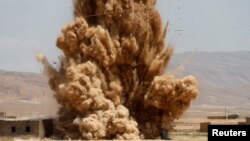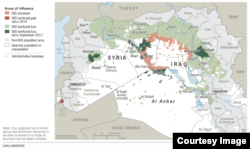It will take years to remove improvised explosive devices left behind by Islamic State fighters who fled Raqqa, the Syrian city that served as the capital of the terror group's self-declared caliphate.
A coalition official involved in the U.S.-led anti-IS campaign estimated "tens of thousands" of unexploded IEDs remain in Raqqa, which was captured by U.S.-backed forces in October after nearly three years of Islamic State rule.
"The scale of this is unprecedented," the official said Monday. "These are high-end, factory-made" IEDS. Many of the bombs are disguised as common household items such as vacuum cleaners, and some houses have six to seven bombs each, he said.
But officials are optimistic about the progress against Islamic State. A total of 7.7 million people in Iraq and Syria have been "liberated" from the terror group, according to a U.S. military handout.
"The physical caliphate has been destroyed ... but I don't want to confuse this with the ultimate defeat of ISIS. We're a long way from that," the coalition official told reporters in Kuwait who are traveling with Defense Secretary Jim Mattis. ISIS is an acronym for Islamic State.
In the past year, U.S.-backed forces have captured Raqqa and Mosul, the group's former stronghold in Iraq. But pockets of resistance remain, especially along the Euphrates River.
"There are still some pockets able to provide some resistance," said the coalition official, citing as an example a 200-person Islamic State "counterattack" on coalition forces just days ago.
A major concern is that many of the underlying causes of the conflict, such as Sunni grievances against Shiite policies or the continued rule of Syrian President Bashar al-Assad, have not been fully addressed.
"I absolutely have a concern" about those unresolved issues, the official said, stressing there's no guarantee of peace. "A lot depends on the actions of the [Syrian regime]," he added.
The official declined to say how many U.S. troops are in Syria. Officially, there are 503 U.S. troops there, but a recent quarterly report by the Pentagon's personnel agency suggested there may be nearly three times that many.





